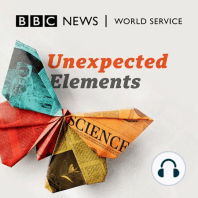61 min listen

Mekong Delta will sink beneath the sea by 2100
Mekong Delta will sink beneath the sea by 2100
ratings:
Length:
61 minutes
Released:
May 8, 2022
Format:
Podcast episode
Description
The Mekong Delta is home to 17 million people and is Vietnam’s most productive agricultural region. An international group of scientists warn this week that almost all of the low lying delta will have sunk beneath the sea within 80 years without international action. Its disappearance is the result of both sea level rise and developments such as dams and sand mining, as Matt Kondolf of the University of California, Berkeley explains to Roland Pease.
Also in the programme:
Seismologist Laura Emert on using the rumbling of traffic in Mexico City to monitor earthquake hazards.
Mars-shaking Marsquakes – recent record-breaking quakes on Mars explained by seismologist Anna Horleston of Bristol University.
A record-breaking high jumping robot designed by mechanical engineer and roboticist Elliot Hawkes which is so light it can access any terrain, perhaps even the moon.
And gene editing….
Humans now have the ability to directly change their DNA and gene-editing tool CRISPR has led to a new era in gene-editing. CrowdScience listener ‘Bones’ wants to know how gene-editing is currently being used and what might be possible in the future.
Gene-editing offers huge opportunities for the prevention and treatment of human diseases, and trials are currently underway in a wide range of diseases like sickle cell anaemia. CrowdScience presenter Caroline Steel finds out about some of the most promising work tackling disease before turning to consider the possibilities of using gene editing for non-medical changes.
Will we be able to extend human longevity, swap our eye colour or enhance athletic performance? And even if we can do all these things, should we?
As scientists push the boundaries of gene-editing and some people are DIY experimenting on themselves with CRISPR, we discuss the practical and ethical challenges facing this promising but potentially perilous area of science.
Photo: Mekong River in Kampong Cham, Cambodia
Credit: Muaz Jaffar/EyeEm/Getty Images
Presenters: Roland Pease and Caroline Steel
Producers: Andrew Luck-Baker and Melanie Brown
Also in the programme:
Seismologist Laura Emert on using the rumbling of traffic in Mexico City to monitor earthquake hazards.
Mars-shaking Marsquakes – recent record-breaking quakes on Mars explained by seismologist Anna Horleston of Bristol University.
A record-breaking high jumping robot designed by mechanical engineer and roboticist Elliot Hawkes which is so light it can access any terrain, perhaps even the moon.
And gene editing….
Humans now have the ability to directly change their DNA and gene-editing tool CRISPR has led to a new era in gene-editing. CrowdScience listener ‘Bones’ wants to know how gene-editing is currently being used and what might be possible in the future.
Gene-editing offers huge opportunities for the prevention and treatment of human diseases, and trials are currently underway in a wide range of diseases like sickle cell anaemia. CrowdScience presenter Caroline Steel finds out about some of the most promising work tackling disease before turning to consider the possibilities of using gene editing for non-medical changes.
Will we be able to extend human longevity, swap our eye colour or enhance athletic performance? And even if we can do all these things, should we?
As scientists push the boundaries of gene-editing and some people are DIY experimenting on themselves with CRISPR, we discuss the practical and ethical challenges facing this promising but potentially perilous area of science.
Photo: Mekong River in Kampong Cham, Cambodia
Credit: Muaz Jaffar/EyeEm/Getty Images
Presenters: Roland Pease and Caroline Steel
Producers: Andrew Luck-Baker and Melanie Brown
Released:
May 8, 2022
Format:
Podcast episode
Titles in the series (100)
Adapting California: Living with the threat of fires and earthquakes by Unexpected Elements